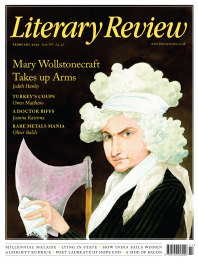Charles Fernyhough
Stem Subjects
The Hidden Spring: A Journey to the Source of Consciousness
By Mark Solms
Profile 415pp £20
The science of consciousness is having a bit of a moment. Long confined to the margins because of concerns about how experimental methods could possibly get a grip on the vagaries of subjective experience, consciousness has become neuroscience’s glittery new thing, the subject of colourful theories, packed-out conventions and the wildest of claims. Understanding how that blob of matter between your ears can experience the sound of a loved one’s voice or the perfume of white tea has become the holy grail of brain science, with implications for artificial intelligence and the ethics of dealing with the dying and the not-yet-born.
A scholar and clinical specialist in brain damage as well as a trained psychoanalyst, Mark Solms is perhaps best known for founding the niche field of ‘neuropsychoanalysis’, the aim of which is to integrate the wisdom of psychodynamic theory with the advances of brain science. No surprise, then, to see him starting his journey to the source of consciousness with a figure who has an uneasy status in neuroscience: Sigmund Freud. As psychology undergraduates are still taught, Freud is the mercurial character who gave us an entire conceptual system for understanding emotions but said little that could stand up in the laboratory. It is Freud’s insights into the affairs of our hearts, along with some tantalising glimpses of how he understood them to be instantiated in the brain, that provide the raw material for Solms’s breathless new analysis of how consciousness comes to be. The title of his book might easily have been ‘Freud was a Neuroscientist’.
It’s all about feelings, then, not thoughts or words or the computations of an information-processing brain. No one gets out of bed without them, and consciousness needs their oomph too. Solms argues that our failure to come anywhere close to solving the mysteries of subjective awareness stems from our obsession

Sign Up to our newsletter
Receive free articles, highlights from the archive, news, details of prizes, and much more.@Lit_Review
Follow Literary Review on Twitter
Twitter Feed
Under its longest-serving editor, Graydon Carter, Vanity Fair was that rare thing – a New York society magazine that published serious journalism.
@PeterPeteryork looks at what Carter got right.
Peter York - Deluxe Editions
Peter York: Deluxe Editions - When the Going Was Good: An Editor’s Adventures During the Last Golden Age of Magazines by Graydon Carter
literaryreview.co.uk
Henry James returned to America in 1904 with three objectives: to see his brother William, to deliver a series of lectures on Balzac, and to gather material for a pair of books about modern America.
Peter Rose follows James out west.
Peter Rose - The Restless Analyst
Peter Rose: The Restless Analyst - Henry James Comes Home: Rediscovering America in the Gilded Age by Peter Brooks...
literaryreview.co.uk
Vladimir Putin served his apprenticeship in the KGB toward the end of the Cold War, a period during which Western societies were infiltrated by so-called 'illegals'.
Piers Brendon examines how the culture of Soviet spycraft shaped his thinking.
Piers Brendon - Tinker, Tailor, Sleeper, Troll
Piers Brendon: Tinker, Tailor, Sleeper, Troll - The Illegals: Russia’s Most Audacious Spies and the Plot to Infiltrate the West by Shaun Walker
literaryreview.co.uk